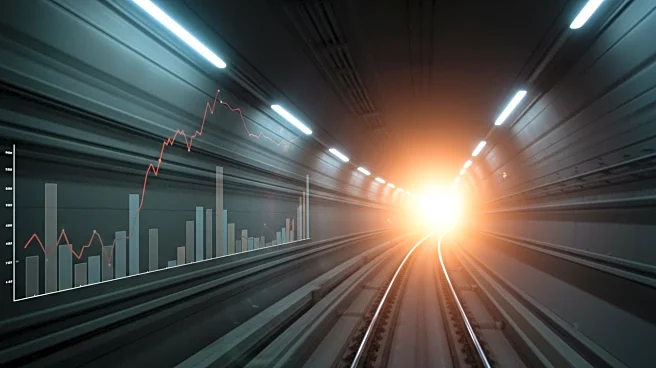What's Happening?
The United Kingdom has experienced an unexpected rise in inflation, with the Consumer Prices Index (CPI) reaching 3.8% in July, marking the highest rate in over 18 months. This increase surpasses economists' predictions of a 3.7% rise. The Retail Prices Index (RPI), which influences rail fare calculations, also rose from 4.4% in June to 4.8% in July. This could lead to nearly 6% fare hikes in 2026 if the government maintains its current formula. The Bank of England has warned that inflation might hit 4% by September, driven by escalating food and energy prices. Food inflation alone jumped to 4.9% in July, contributing significantly to the overall inflation rate. Transport and hospitality costs have also added pressure, with events like Oasis's reunion tour impacting hotel prices in major cities.
Why It's Important?
The inflation surge poses significant challenges for UK households, particularly as food and transport costs continue to rise. Families are already feeling the strain, with many forced to cut back on spending. Retailers are struggling to absorb these costs, leading to potential price increases across various sectors. The situation is exacerbated by the recent administration of Claire's Accessories, highlighting the retail industry's vulnerability. The Chancellor, Rachel Reeves, faces mounting pressure to address these inflationary pressures, especially with predictions of food inflation reaching 5.5% by Christmas. The potential rail fare hikes could further burden commuters, impacting daily expenses and overall economic stability.
What's Next?
Chancellor Rachel Reeves is under pressure to implement measures to curb inflation and prevent further economic strain on households and businesses. The Bank of England's warnings suggest that immediate action may be necessary to stabilize prices, particularly in the food sector. Retailers may continue to face challenges in managing costs, potentially leading to more closures or administrations if inflation persists. The government may need to reconsider its rail fare calculation formula to avoid significant fare increases that could impact commuters and the broader economy.
Beyond the Headlines
The inflationary trend raises ethical and economic questions about the sustainability of current pricing models and the impact on vulnerable populations. The retail sector's struggles highlight the need for innovative solutions to manage costs without passing them onto consumers. Long-term shifts in consumer behavior may occur as households adjust to higher living costs, potentially affecting demand for non-essential goods and services.











